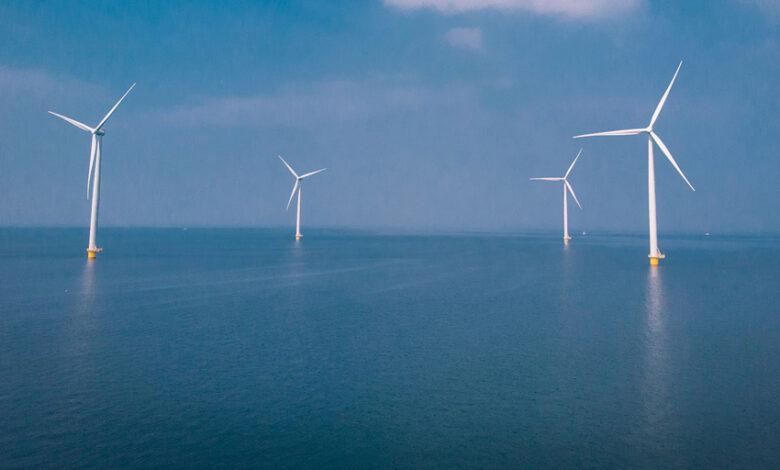ESB stands ready to deliver renewable offshore wind energy for Ireland

Offshore wind generated energy will play a major role globally in mankind’s fight against climate change and our transition to a zero-carbon economy.
The Irish Government, in the Programme for Government (2020), committed to developing a plan setting out how Ireland will take advantage of the massive potential of offshore energy. The Government target in the Climate Action Plan 2023, is to achieve 7GW (7,000MW) capacity of installed offshore wind by 2030.
As we know, Ireland’s geographic position is particularly good for generating electricity from wind. Power from onshore wind farms currently provides over one-third of Ireland’s electricity needs. Indeed the “real” map of Ireland shows that Ireland has jurisdiction over a marine area that is many times the size of our landmass yet there is just one offshore wind farm on the east coast (the Arklow Bank, 25MW). Otherwise, Irish offshore wind energy is a totally untapped resource. There are a number of countries in Europe that have far shorter coastlines, that have already developed significant offshore wind electricity generation (e.g., while the Irish coastline stretches to 3,000km, Belgium with a coastline of 63km, has developed more than 2GW of offshore wind). Our nearest neighbour, the UK has already developed over 10GW of offshore wind electricity generation.
The purpose of this article is to inform about ESB’s plans and share our perspectives on the development of Offshore Wind in Ireland. As outlined here, ESB has and will continue to play a leading role in Ireland’s transition to a low-carbon energy future, powered by clean electricity. We have developed almost 1GW of clean renewable energy both at home and abroad and we have ambitious plans to build on this over the coming years.
Paddy Hayes, Chief Executive of ESB puts it this way: “Our strategy, Driven to Make a Difference: Net Zero by 2040, calls out the importance of developing and connecting more renewable generation. We aim to play a positive role in developing Ireland’s offshore wind for the benefit of the people of Ireland, with care for the marine environment and in consultation with marine users and local communities.”
First some background facts:
• The Climate Action and Low Carbon Development Act 2021 commits Ireland to achieving a carbon neutral economy by no later than the end of 2050.
• The Climate Action Act 2021 also commits Ireland to a net 51 per cent carbon reduction 2021-2030, relative to a 2018 baseline. Ireland also supports the EU target of a 55 per cent reduction in carbon emissions by 2030 compared to 1990 levels.
• Ireland’s electricity will be powered by 80 per cent renewables by 2030 (from 40 per cent national target in 2020).
• 7GW of offshore wind will be operational by 2030 (only one 25MW wind farm currently).
• Offshore wind farms in Ireland on the east coast can achieve capacity factors of approx. 45 per cent (depending on the technology employed), meaning that a 1GW wind farm will generate approximately 4TWh (4,000,000MWh) per year and on the west coast they will have capacity factors of approximately 50 per cent.
• There is potential to develop between 9.2GW and 12GW from fixed wind and at least 27GW from floating wind in the Irish marine area, within 100km of Ireland’s coast.
• The EU target is 300GW of installed offshore wind capacity by 2050. By 2030, the EU strategy aims for 60GW of offshore wind installed in the waters off the coastal member states.
• Based on current plans, over 60 per cent of the electricity produced by ESB’s power generation portfolio will be from renewable or zero-carbon sources by 2030. We will also invest in assets that support a high level of renewables on the system such as energy storage, flexible generation, synchronous condensers, and power-to-gas. Furthermore, ESB has announced as a key element of its strategy, a drive to achieve net-zero for its operations by 2040 and to put in place the infrastructure and services to enable customers to do likewise.
“Based on current plans, over 60 per cent of the electricity produced by ESB’s power generation portfolio will be from renewable or zero-carbon sources by 2030.”
ESB is developing the Oriel Windfarm project and the nearby Clogherhead project off the coast of County Louth with Parkwind NV, a Belgian-based offshore wind farm developer. Oriel is a government designated ‘relevant project’ which means that it is in the first batch of projects with a right to be processed for a Maritime Area Consent (MAC) and therefore likely to compete in Ireland’s first ORESS auction, planned for the first half of 2023. ESB is also progressing plans for seven different offshore wind farms in Irish waters all around the coast, including floating offshore wind farms off the south and west coasts and will shortly be announcing a new joint venture partner for these projects.
The UK offshore wind industry is the most developed in the world and ESB has invested significantly, working with a variety of partners, on four major projects totalling over 2GW, to further develop our involvement and expertise.
In Ireland, while the industry focus now is rightly on fixed-bottom turbines on the east coast, new floating offshore wind technology that can be situated in much deeper waters will be key to realising Ireland’s full offshore wind potential. ESB has ambitious plans to develop floating offshore wind for Ireland. Most notable is our Green Atlantic @ Moneypoint project, a visionary project of scale.
The Irish Government, in its Programme for Government 2020, has committed to producing a longer-term plan setting out how, as a country, we will take advantage of the massive potential of offshore energy on the Atlantic coast. This plan will set out how Ireland can become a major contributor to a pan-European renewable energy generation and transmission system, including the development of green hydrogen infrastructure (where at times of excess wind energy availability, electrical energy can be converted and stored as hydrogen via electrolysis), taking advantage of a potential of at least 30GW of offshore floating wind power in our deeper waters in the Atlantic. ESB stands ready to play a full role in making that vision a reality.
ESB believes that it has a unique responsibility by virtue of its heritage and values to support government policy to fight climate change by leading the low carbon transition in Ireland. We commit to playing a strong role in developing Ireland’s offshore wind for the benefit of the Irish people and with due care for the environment. ESB commits to proactively engaging with the public and particularly communities affected by ESB’s offshore developments. We will do this in at least five ways:
(1) ESB will share all relevant information about ESB offshore projects in a comprehensive and timely fashion. ESB will listen to community concerns and will work in partnership with the communities to resolve any issues that might arise.
(2) ESB supports the concept of a fair transition where all members of society benefit and will support government initiatives in this area.
(3) ESB will contribute to community funds for offshore wind developments as it has done for onshore wind developments so that local communities benefit directly from the projects.
(4) ESB will show due respect for our Irish marine environment at all times and will work to the highest environmental and ethical standards only.
(5) ESB is supportive of formal co-ordinated dialogue with the fishing industry and other marine users.
E: deaglan.odonaill@esb.ie
W: www.esb.ie






